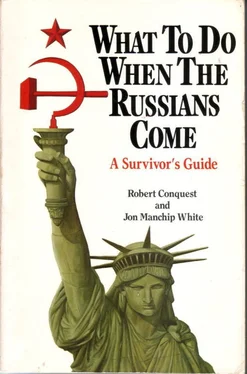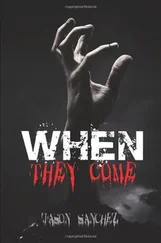Robert Conquest - What to Do When the Russians Come
Здесь есть возможность читать онлайн «Robert Conquest - What to Do When the Russians Come» весь текст электронной книги совершенно бесплатно (целиком полную версию без сокращений). В некоторых случаях можно слушать аудио, скачать через торрент в формате fb2 и присутствует краткое содержание. Город: New York, Год выпуска: 1984, ISBN: 1984, Издательство: Stein and Day Inc., Жанр: Публицистика, на английском языке. Описание произведения, (предисловие) а так же отзывы посетителей доступны на портале библиотеки ЛибКат.
- Название:What to Do When the Russians Come
- Автор:
- Издательство:Stein and Day Inc.
- Жанр:
- Год:1984
- Город:New York
- ISBN:0-8128-2985-9
- Рейтинг книги:3 / 5. Голосов: 1
-
Избранное:Добавить в избранное
- Отзывы:
-
Ваша оценка:
- 60
- 1
- 2
- 3
- 4
- 5
What to Do When the Russians Come: краткое содержание, описание и аннотация
Предлагаем к чтению аннотацию, описание, краткое содержание или предисловие (зависит от того, что написал сам автор книги «What to Do When the Russians Come»). Если вы не нашли необходимую информацию о книге — напишите в комментариях, мы постараемся отыскать её.
What to Do When the Russians Come — читать онлайн бесплатно полную книгу (весь текст) целиком
Ниже представлен текст книги, разбитый по страницам. Система сохранения места последней прочитанной страницы, позволяет с удобством читать онлайн бесплатно книгу «What to Do When the Russians Come», без необходимости каждый раз заново искать на чём Вы остановились. Поставьте закладку, и сможете в любой момент перейти на страницу, на которой закончили чтение.
Интервал:
Закладка:
The death or deposition of the president and vice-president, assuming that they have not managed to flee the country, will be handled in the same way. Possibly it might not be necessary to execute or even depose them, at least at first; compromised by the responsibility of signing the instrument of surrender, they might prove to be acceptable figureheads during a brief transitional phase. They could of course be forced to resign or be impeached by a pliable Senate and replaced, in the manner provided for in the American Constitution, by a Speaker newly elected by a much-changed House of Representatives. But there might be time enough to get rid of them when the regular presidential election year arrives, when the outward appearance of traditional practice would be maintained.
The main thrust of the Russians will, of course, be behind the Communist Party of the United States. It will be confronted with a formidable task of organization. It will be given all the money, premises, and access to the media it requires and some control of security and other armed groups. Initially it will attract a swarm of recruits in the shape of careerists, but as an obvious stigma will attach to it in the minds of most Americans, it will quickly seek to expand itself by other means as well. After a short interim period, for example, it will attempt to merge with other organizations of the Left into a “united party” under effective Communist guidance. At this juncture, what you will probably see is a “Unity Congress,” with a Socialist party splinter group pretending to be the entire party, a similar pseudorepresentation of the American Labor party based in New York, and a revived Farmer-Labor party, all funded and controlled by the Soviets and stiffened with Communist cadres. In addition any New Left groups that had previously been identified in any way with Leninism will be represented. Soon a merger between all these Leftist groupings will be arranged, under the name of the now fake Farmer-Labor party or the equally fake Socialist party. In this way a respectable-looking basis for establishing a third major party under total Communist control would be provided, and the new party would enter into a “coalition” with the remains of the Democratic and Republican parties and gradually work toward dominating the whole state apparatus.
To begin with, the American Communist party will necessarily find itself somewhat shorthanded. We should note that, even on official figures, the Romanian Communists numbered only a thousand in a country of eighteen million and were nevertheless a mass party, in total control, with the usual set of puppet democratic parties only holding a few decorative posts, within a year of the arrival of the Soviet army.
It is of course not the case that there will be thousands and thousands of Americans who are suddenly converted to communism or show themselves to have been unsuspected sympathizers of it all the time. It will simply not be possible for the new rulers to operate entirely, or even to a very great extent, through the sort of people they would wish to have in charge. They will work, instead, through the careful establishment of Communists and others prepared, for whatever reason, to do their will in a comparatively limited number of key posts.
From these they will enroll, as far as possible, a broader section of the population, including those who have any favorable opinion whatever of the Soviet system or of its replicas in Vietnam and elsewhere and even of those who merely dislike the American system as it was before the Occupation, together with the unscrupulous and the ambitious.
It has been reckoned that, in any population, about 2–3 percent of the people in the country will be ready to carry out, for power and payment, the most revolting tasks that any regime whatever wishes to perform. The Communists could therefore certainly look forward to about a couple of million persons to staff their operations. This is a smallish number, but on the record of other countries, it will be found enough (with Soviet help) to provide a just adequate framework for administering and controlling factories, schools, offices, and municipalities.
Their control will be spread thin at first and gradually strengthen. If you are not favorably inclined to the new regime but have passively accepted it out of apathy or inability to see any alternative, you may find yourself a manager, school principal, or whatever. But you should note that your prospects of longer tenure are low.
Even when, by such methods, the Communist party has expanded to its maximum, membership will not be granted to all who wish to join. There comes a point at which the party is big enough to control the country and holds all the posts with even the slightest influence down to township level; then recruitment will ease off, and purging and discipline of the new membership will become intense (see chapter 5 5. THE INDIVIDUAL BY PROFESSION, OPINION, AND HABIT We have given you something of the general picture of what your life, as an American, will be like under Soviet rule—and we shall be giving you more in later chapters. But you will also be anxious to know how someone of your own particular professional and ethnic and political and tempermental background is likely to fare. In the pages that follow, we look into the special conditions facing a wide variety of these, of a reasonably representative nature, from Academic to Farmer, from Realtor to Industrial Worker, from Black to Student, from Homosexual to Feminist, from Soldier to Traitor.
).
Under the party, as its youth subsidiaries, will be two much bigger organizations (already in existence), the Young Communist League and the Pioneers.
The Young Communist League will be extended to enroll millions of young people in their teens and early twenties, and membership will be a virtual requisite for a large number of jobs above the most menial. Its branches will be under the control of party members, and all Young Communists will be required to obey party orders, to attend indoctrination sessions, and to operate as an arm of the party in their schools, streets, and homes.
The Pioneers are a sort of ghastly parody of the Scouts and Guides and were consciously so right from the start. They will be virtually compulsory for all preteenage schoolchildren. The Pioneers will be subjected to a simple style of propaganda, be given many attractions, go to indoctrination-infested summer camps, and have various solemn ceremonies in which, for example, they dip their richly embroidered flags in the memory of Lenin and take oaths of loyalty to the organization and its aims.
The whole apparatus of state legislatures, city councils, and so forth, will continue. But you will get used to the idea that the real power in your neighborhood is not in the hands of these officials but in those of the local party secretaries. Legislatures, including Congress in Washington itself, will meet less and less frequently until it is a matter of no more than five or ten days a year that they will be in session to unanimously pass bills laid before them by the Communist authorities.
As one of the principal agencies of restraint, the new government will be able to rely, of course, on a totally reorganized FBI—for it is possible that the old name will be kept, again for purposes of continuity, although behind the facade, the whole organization will have been virtually dissolved (and all operatives who have been concerned with preventing subversion or countering Soviet espionage are liable to be shot). If those present in the top echelons have the time and the opportunity, it is to be hoped that they have already made arrangements to destroy all sensitive files, in order that agents now working under cover may have some chance of survival. Similarly, the names and dossiers of left-wing but anti-Soviet activists, who might help to provide a nucleus of anti-Soviet resistance, should not be allowed to fall into the hands of the Russians, who are likely to be unprecedentedly thorough in their elimination of such persons.
Читать дальшеИнтервал:
Закладка:
Похожие книги на «What to Do When the Russians Come»
Представляем Вашему вниманию похожие книги на «What to Do When the Russians Come» списком для выбора. Мы отобрали схожую по названию и смыслу литературу в надежде предоставить читателям больше вариантов отыскать новые, интересные, ещё непрочитанные произведения.
Обсуждение, отзывы о книге «What to Do When the Russians Come» и просто собственные мнения читателей. Оставьте ваши комментарии, напишите, что Вы думаете о произведении, его смысле или главных героях. Укажите что конкретно понравилось, а что нет, и почему Вы так считаете.












